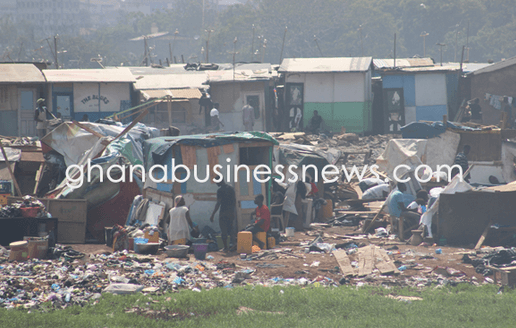Providing housing to slum dwellers is urgent policy issue – Study
 Providing housing to slum dwellers, protecting them from natural disasters and diseases and connecting them to jobs and services through improved infrastructure are urgent policy issues in many sub-Saharan African cities, a study conducted by the World Bank with support from the Ghana Statistical Service shows.
Providing housing to slum dwellers, protecting them from natural disasters and diseases and connecting them to jobs and services through improved infrastructure are urgent policy issues in many sub-Saharan African cities, a study conducted by the World Bank with support from the Ghana Statistical Service shows.
The study titled “Monetary and Non-monetary Poverty in Urban Slums in Accra: Combining Geospatial Data and Machine Learning to Study Urban Poverty” noted that slum populations are growing at 4.5 per cent per year in sub-Saharan Africa.
It notes that population expansion of slums may not be only due to migration but also due to a higher birth rate.
The study found that women in slums tend to have more children, creating more pressure for local government to provide education to children of slum residents. It further states that high birth rate among women deprives them of future human capital and empowerment, stressing the need for female empowerment programmes as an effective policy intervention. It also establishes a strong correlation between living in slums and higher monetary poverty.
“Living in slums is strongly correlated with higher monetary poverty, higher fertility among women and low school attendance among children,” the study points out.
“Slum areas tend to be of high population density and low elevation which in Accra are generally flood-prone areas, noting that identifying the location and living conditions of slums is a critical step toward designing effective urban policies. By combining household survey data and census data with high spatial resolution satellite imagery and using machine learning, this study attempts to define slums objectively within the city of Accra,” it says.
Defining slums with reference to the United Nations Settlements Program (UN-Habitat), the study says a slum household is a household lacking access to improved water, sanitation, sufficient living area, durable housing, and security of tenure, adding that access to services and infrastructure often vary across countries, making it difficult to define applicable criteria of slums universally.
The study however clarifies that the definition of slums by the UN-Habitat does not account for population density and exposure to natural disasters.
A senior economist with the World Bank, Tomomi Tanaka presenting highlights of the study at the World Bank office in Accra, said the study indicates that religious ties are one of the important social factors that explain why people keep living in slums, adding that ethnic ties are also key factors of long-term slum residency.
“People who live in the slums they were born in tend to live in the communities where the percentage of people who follow the same religion is higher than the average Accra city,” she said of the study.
“People keep living in the slums for economic opportunities and for the social network that helps them get jobs, thus relocation of slum residents may not be the sensible policy option for the government,” the study suggests.
By Solomon Otu Mensah
Copyright © 2017 by Creative Imaginations Publicity
All rights reserved. This news item or any portion thereof may not be reproduced or used in any manner whatsoever without the express written permission of the publisher except for the use of brief quotations in reviews.
